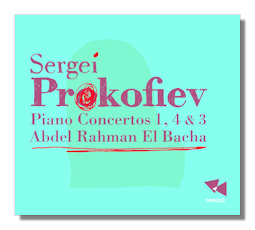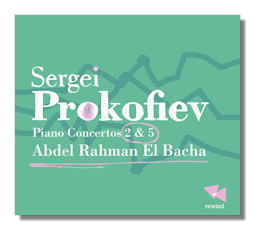
The Internet's Premier Classical Music Source
Related Links
- Prokofieff Reviews
- Latest Reviews
- More Reviews
-
By Composer
-
Collections
DVD & Blu-ray
Books
Concert Reviews
Articles/Interviews
Software
Audio
Search Amazon
Recommended Links
Site News
 CD Review
CD Review
Serge Prokofieff

The Concertos for Piano
- Piano Concerto #1 in D Flat Major, Op. 10
- Piano Concerto #4 for the Left Hand in B Flat Major, Op. 53
- Piano Concerto #3 in C Major, Op. 26
Abdel Rahman El Bacha, piano
The Monnaie Symphony Orchestra/Kazushi Ono
Rewind 509 54m


- Piano Concerto #2 in G minor, Op. 16
- Piano Concerto #5 in G Major, Op. 55
Abdel Rahman El Bacha, piano
The Monnaie Symphony Orchestra/Kazushi Ono
Rewind 517 66m
The two discs comprising this cycle of the five Prokofiev piano concertos have been issued separately as the heading indicates, and are thus not a boxed set, though they may eventually appear in that form. The performances contained on them were derived from several live 2004 concerts at the Palace of Fine Arts in Brussels, Belgium. They were originally issued on the Fuga Libera label in February, 2005 and generally drew positive reviews. The pianist Abdel Rahman El Bacha may not be a household name but he has led a highly successful career on the world's concert stages and achieved considerable renown for his recordings. El Bacha was born in Lebanon in 1958 and won the prestigious Queen Elizabeth Competition in 1978, while still nineteen. For most of his adult years El Bacha has lived in France, though he relocated to Switzerland in 2012. He tackles these five challenging concertos with confidence and a sense that he fully understands Prokofiev's music – but in the process he goes up against stiff competition.
There have been around fifteen complete cycles of the Prokofiev piano concertos, and the more successful ones include Ashkenzay (Decca), Beroff (EMI), Bronfman (Sony), Browning (Testament, originally RCA), Bavouzet (Chandos), Paik (Naxos), Toradze (Decca) and Tacchino (Vox). I would say that El Bacha's performances compare favorably with better efforts here. Oddly, while most of the complete concerto sets contain good performances, very few of them are consistently compelling throughout. Bavouzet, whose set was released earlier this year, is one of those who maintains a fairly consistent high level of play, as he makes a good case for his elegant, tasteful and slightly understated approach. Ashkenazy is also quite convincing in his more muscular, more Russian take on these works. El Bacha is another pianist who is reasonably consistent in all five, and I would say he is a bit closer in style to Bavouzet than to Ashkenazy.
El Bacha is more likely to eschew percussive playing in favor of subtlety; more likely to share the spotlight with the orchestra than to overpower it; and he tends to avoid extremes in tempo choices and dynamics. That said, he doesn't sand the rough edges off Prokofiev's often acerbic surfaces, nor does he soften Prokofiev's sometimes bluff lyricism. Try his introduction of the alternate theme in the finale of the Second, and notice how he gives an edge to its melancholy lyrical character by playing it with a jaunty brittleness. Or hear how he imparts a passionate and fiery quality to the big theme in the finale of the Third. El Bacha is never short on energy, either: the mostly lively Fourth Concerto effervesces with sunlit vigor in the outer movements and in much of the third movement. The First has an appropriately youthful character and the Fifth comes across with a mixture of elegance and sass. He seems to deftly balance all elements of Prokofiev's very broad and protean style.
Kazushi Ono draws absolutely splendid playing from La Monnaie Symphony Orchestra. Indeed, the ensemble plays with spirit and grit, and you hear much detail often buried in other performances. I don't believe I've ever delighted as much over the playing of the tuba in these works as here. The sound reproduction is clear but the acoustics are somewhat dry. Oddly, the percussion has a boomy sound at times, but overall you hear the scores clearly.
To conclude, let me say it's easier to assemble a set of Prokofiev concertos from individual performances: Argerich or Richter in the First; Yuja Wang in the Second (Deutsche Grammophon 4791304); Cliburn or Janis in the Third; Serkin in the Fourth; and Richter or Boris Berman in the Fifth. It's much harder to rank the various sets of the Prokofiev concertos, but if you want just one, this effort by El Bacha should do fine. Certainly his cycle can stand with the finest previous sets, those by Ashkenazy, Beroff (but he is hampered by shrill sonics), Browning, and Bavouzet. Highly recommended!
Copyright © 2014, Robert Cummings





















